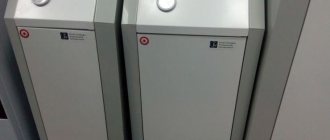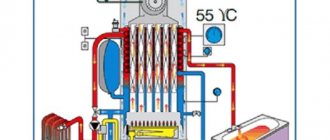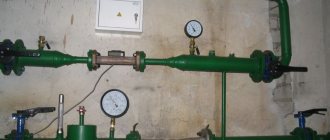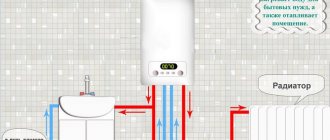Normally, the boiler should operate absolutely silently. The appearance of crackling, popping and noise indicates the presence of malfunctions in its operation. The reasons can be very diverse. Each individual case will require an individual approach to solving the problem.
Causes of noise and boiler hum
Noise diagnostics
The operation of a boiler with a water heating circuit is often accompanied by noise. It not only brings significant discomfort, but can also be potentially dangerous for everyone in the household. Therefore, it is not worth leaving this problem without a solution.
Before identifying the cause of the deficiency, the nature of the extraneous sounds should be determined. This will help in diagnosis and increase the chances of successfully fixing the problem.
The most common defects of boilers in a fireplace include:
- quiet knocking in the boiler;
- a crackling sound that occurs when the heating system is turned on;
- regular appearance of hum;
- vibration;
- periodically repeating clicks.
All of these signs indicate that the problem needs to be corrected. If you ignore them, the situation may be resolved by a complete breakdown of the entire heating system.
Expert opinion
Filimonov Sergey Vinokurovich
Heating equipment repairman
A loud bang that occurs when igniting may indicate gas accumulation. To avoid undesirable consequences, it is necessary to evaluate the condition of the electrodes, burner and connections.
Possible causes of extraneous sounds
Knocking and clanging in the boiler can be caused by both indirect and completely understandable reasons. In the first case, we may be talking about a broken installation, wear of components and incorrect settings.
The following factors can also provoke the appearance of extraneous sounds:
- Formation of scale layers on the walls of the heat exchanger . This happens due to the large amount of salts in the water. To prevent the problem, it is necessary to cleanse it once a year using specialized products.
- Increased pressure in the water pump or lack of water in the system . Under unfavorable conditions, these phenomena lead to an emergency situation.
- Oversaturation with air . In this case, the problem will be accompanied by the appearance of a characteristic knocking sound. To stabilize the situation, it is enough to release excess air from the system.
- Fan malfunction . This occurs due to the accumulation of dirt or drying out of the grease in the bearings.
- A clogged chimney or wick is a common problem with semi-automatic boilers. Diagnostics consists of checking the presence of traction. To do this, you need to bring a burning match to the ventilation window. If the flame burns evenly, it means the mine needs to be cleaned. It is advisable to contact utility services for these purposes.
- Malfunctions in the three-way valve . With this problem, a characteristic crackling sound will be observed every time you ignite. To correct the situation, the valve must be replaced.
- Incorrect installation of the gas burner in the boiler . In this case, whistling or tapping sounds will occur. To prevent this problem, you need to compare whether the gas pressure level matches the parameters indicated in the technical data sheet as recommended.
- Violation of the system installation technique may result in sounds of impacts on a metal surface occurring in the device body . They are provoked by the expansion of the pipe when the heating system is turned on. This problem is typical for pipes embedded in the wall without leaving a gap specifically for thermal expansion.
- Clogging of the heat exchanger plates with soot and dust . Parts must be cleaned regularly using a specialized vacuum cleaner.
Other Possible Causes
Another phenomenon that worries owners of gas equipment is the clicking and popping noises that occur during ignition. Failures are possible in the following components:
- in a three-way valve. It serves as a switch between domestic hot water and heating; when a malfunction occurs, it clicks. The solution to the problem is to install a new one;
- in the ignition unit. A loud bang accompanying the long appearance of a spark indicates the accumulation of gas, which subsequently flares up. It is necessary to carry out diagnostics - inspect the burner, electrodes, igniter, contacts.
If a blockage has formed in the wick or chimney, the boiler will bang when ignited, which often happens with semi-automatic models.
Clogged injectors are indicated by noise during heating, while it is extremely difficult to ensure ignition, and a fragmentary flame occurs. Here you need to stop the gas supply and clean the holes with a thin wire.
A clogged wick is recognizable upon inspection and is easy to clean. In the case of a chimney shaft, you need to make sure that there is draft: bring a match flame to the ventilation or control window; if the fire is steady, you will have to remove the blockage. In units with automatic ignition, the electrode often gets clogged.
If the installation was carried out incorrectly, the clanging of metallic impacts may occur if the housing is hung incorrectly. When heated and cooled, the metal changes its geometric parameters; expansion and contraction are accompanied by loud sounds.
The same processes are characteristic of pipes walled into walls, so when installing them it is important to leave an expansion gap.
If the heat exchanger plates are clogged, the boiler also begins to make loud noise when heating, the reason being clogging with soot, dust, and soot. You need to remove the housing and clean all components of the heat exchanger with a special pump or a metal brush. Dust could have clogged up in the mesh, which is visible in the lower part of the body, which causes a decrease in thrust in models with an open combustion chamber.
Resonance due to uneven operation of the circulation pump can also manifest itself in the form of noise. In this case, it is enough to adjust the pump settings.
How to prevent noise
To avoid the appearance of extraneous sounds during the operation of the fireplace, it is necessary to ensure timely maintenance of heating equipment. It includes lubricating parts, removing carbon deposits and dust, cleaning components and monitoring water levels. It is equally important to control the gas supply so as not to provoke an increase in pressure.
If you do not control the water level in the pipes, noise caused by water hammer may appear. It is caused by the force of inertia, due to which the liquid cannot instantly stop in the pipes.
Algorithm of actions when extraneous noise appears
After it is discovered why the boiler is noisy or humming , you need to think about a way to eliminate loud sounds. The best option is to seek help from specialists. But some problems can be solved on your own.
It is advisable to rely on the following principles:
- If a whistle is detected in the heat exchanger, it should be descaled. For these purposes, remove the casing and unscrew all pipes. You need to pour a specialized descaling agent inside. An alternative cleaning method involves using a flexible hose.
- If the water becomes oversaturated with oxygen too quickly, a closed heating system should be preferred. In this case, it is better to replace the expansion tank with a membrane one, and install air vents on the water heating boiler.
- In cases where the pump power is higher than what the system requires, it is necessary to reduce it. To do this, you need to change the position of the white switch, which is located on the terminal block.
- If a suspicious sound comes from the gas meter, then it is advisable to call the gas service. It is possible that the device needs to be replaced.
- When turning on the automatic boiler with cotton, it is necessary to clean the ignition electrodes. If necessary, you need to adjust their location.
- Metallic knocking caused by temperature changes can be eliminated by moving the wall mounts to places that coincide with their support points.
- If the noise is caused by contamination of the fan, it is necessary to carefully remove dirt from the fan blades. It is also advisable to lubricate its bearings. In extreme cases, you may need to completely replace the cooler. But this process is best left to professionals.
- Loud noises during boiler operation are often caused by low pressure. This is typical for power outages, water leaks, improper installation of the boiler, etc. Sometimes the problem is caused by incorrect calculation of potential loads on the system. To get rid of noise, you need to direct action to one of the possible causes.
Reasons why a gas boiler whistles
The most common reasons why a gas boiler whistles are:
- the heat exchanger is clogged;
- fan problem;
- The coolant is saturated with oxygen.
The heat exchanger is clogged
If there is no filter at the entrance to the gas boiler, then scale will accumulate in the heat exchanger over time. Sediment builds up on the walls of the circuit, and over time begins to accumulate on other nodes.
In a clogged heat exchanger, heat transfer deteriorates. As a result, the unit's efficiency decreases and it may make strange sounds, such as whistling.
Sometimes tapping sounds are also heard - they are produced by broken pieces of scale, which, under the influence of water movement, hit the metal walls of the heat exchanger.
…
To get rid of extraneous noise, you should clean the circuit and the entire heating system. In household chemical stores you can find special chemicals that clean out all the scale well.
For prevention purposes, it is necessary to install a filter on the water supply.
Fan problem
The fan in a gas boiler with a closed combustion chamber plays an important function - it removes smoke to the street and facilitates the supply of oxygen to the burner. If there is a malfunction, whistling and noise may occur. More often, this problem occurs if the lubricant has dried out or the element is located above the burner. Then the fan wears out faster.
To solve the problem with the fan, you should call a specialist.
Find out here what to do if your gas boiler blows out?
…
Possible malfunctions of a gas boiler and ways to eliminate them
Why doesn't the gas boiler light up?
The coolant is oversaturated with oxygen
Often the reason why a gas boiler whistles in a private house is an excessive amount of oxygen in the coolant. This problem mainly appears in models with an open type of combustion chamber. When a large volume of oxygen enters the heating system, many air bubbles are formed during the heating process. When they move, a sound appears like a boiling kettle, sometimes accompanied by a whistle.
Oversaturation of the coolant with oxygen does not pose a threat to the equipment. Such noise does not indicate the presence of any damage, but it definitely creates discomfort for others.
To prevent excess air from appearing, it is necessary to make some changes to the heating system:
- the expansion tank must have a membrane;
- install an air vent on the equipment;
- purchase a weather-compensating thermostat.
A whistle may also appear due to a lack of coolant in the system. In this case, the boiler begins to overheat and make noise.
Answers to pressing questions
In what cases can air get into the heating system?
Air bubbles penetrate inside for a number of reasons, the most common of which include the damaged integrity of the ligaments, complete removal of water from the pipes and depressurization of equipment.
Why might the fan be faulty?
The main function of the fan is to remove combustion residues. As a result, it periodically becomes clogged with dust. Under the influence of high temperatures, its lubricant may dry out. All this together stimulates its wear and tear. Sometimes a faulty fan is a manufacturing defect.
What causes a whistle that sounds like a boiling kettle?
The most common reason for this phenomenon is the formation of scale with the subsequent narrowing of the passage of the device. In this case, whistling sounds appear approximately 20 minutes after starting the heating system.
Why do rattling sounds occur when the boiler is turned on?
Rattling occurs when the valve in the boiler wears out badly.
Why does the flame ignite jerkily when the boiler is turned on?
This happens when the injectors are severely clogged. The problem is solved by turning off the gas supply and then cleaning the cavities with a thin wire.
Regardless of the cause of the noise, the problem cannot be ignored. The sooner it is eliminated, the better.
Fan fault
It is difficult to imagine the operation of a heating system without a fan. After all, it performs an important function. Thanks to it, combustion products are removed from the boiler, and the system is blown to remove smoke. If the fan does not work properly, various whistles and noises may appear.
In newer heating boilers this rarely happens, but if the equipment has been in use for more than a year, then this reason is quite common. If there is no lubrication or the fan is located above the burner, it will wear out quickly.
In order to replace the fan, you can call a qualified technician who will quickly perform the replacement. And you won’t have to purchase a new heating boiler.
But various noises may appear due to a decrease in pressure or a lack of coolant in the heating system. If the heating system does not have the required amount of coolant, the gas boiler will begin to overheat, and as a result, various sounds will appear.
In order to eliminate extraneous sounds in a gas boiler, you first need to determine the cause of the noise. If you do not have experience in repairing heating devices, then finding the cause on your own will be quite difficult. Only a specialist can determine by the sound what kind of breakdown has occurred in the boiler. If you decide to look for the cause on your own, you risk making the situation even worse.
On our website you can buy a gas boiler for a private home at a good discount.










